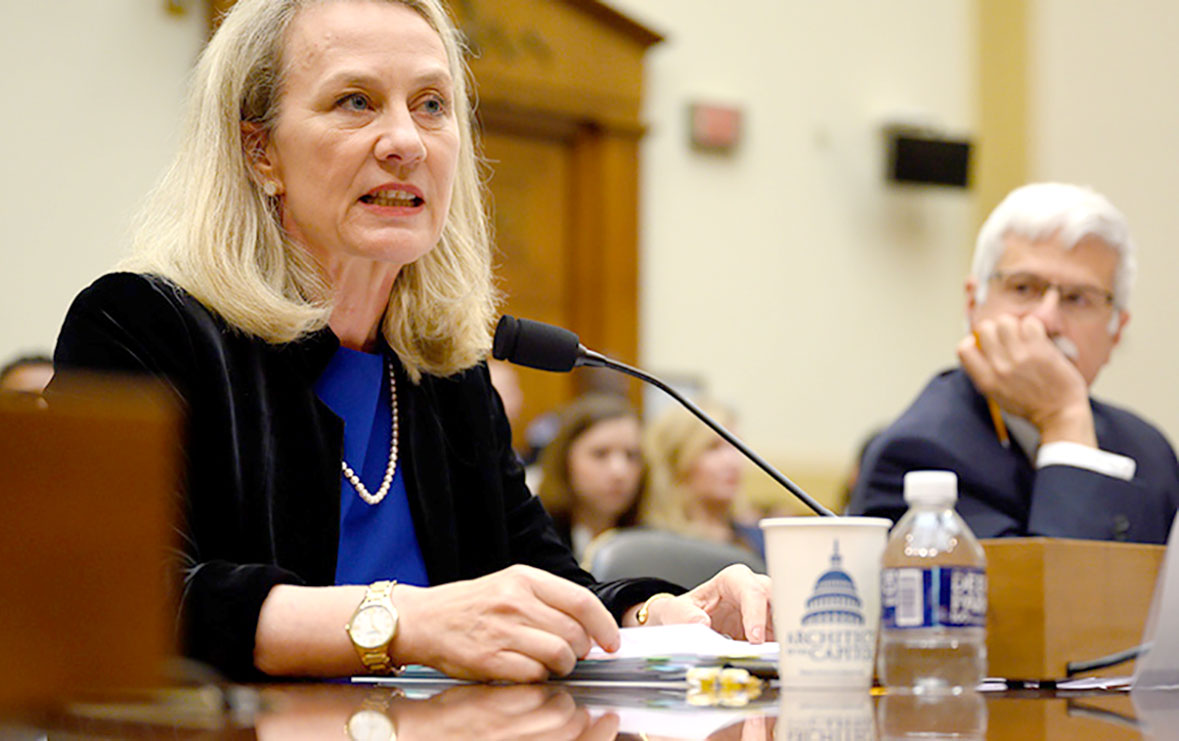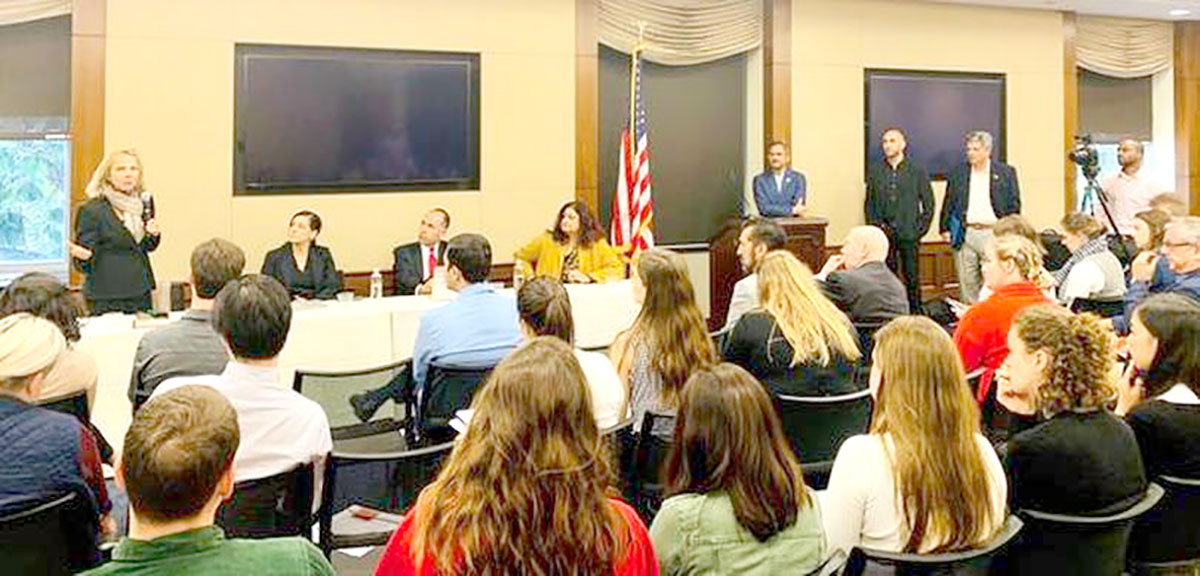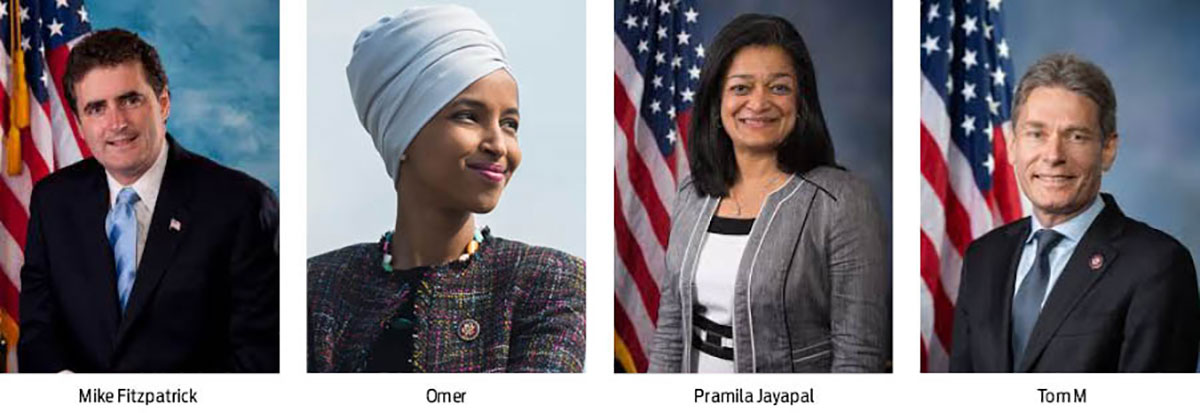There were some highly uncomfortable questions that American Congressmen asked its own officials on Kashmir. The hearing by a Congress Committee on Foreign Affairs, however, led to some clarity in the US stand. The Trump administration sees Delhi’s Kashmir interventions as internal but having external consequences. The sole American concern remains if at all Kashmir can live in dignity, reports Tasavur Mushtaq

Alice G Wells, acting assistant secretary testifying before HFAC as her colleague Robert Destro is watching.
Weeks after Senator Chris Van Hollen mooted an amendment in a crucial report ahead of the annual Foreign Appropriations Act for 2020, that allocates federal funds for furthering American foreign policy, a hearing on Kashmir by the US House of Representatives’ Foreign Affairs Committee (HFAC) offered a rare insight of the US Kashmir policy and concerns of individual Congressmen.
The Asia Sub-Committee actually grilled the State Department officials and heard many people from diverse backgrounds on contemporary Kashmir. Their interventions indicated that the Kashmiri Americans have been quite active educating them about the happenings in Kashmir. The final takeaway was that Trump administration is not opposed to the abrogation of the special status and the downgrade of the state of Jammu and Kashmir to a remotely ruled Union Territory. However, it wanted the bilateral talks between India and Pakistan to resume and is keen to take a position on “whether Kashmiris can live in dignity, and have a full economic and political life.”
Against an expectation that the Committee would take care of the entire South Asia, the Sub Committee Chairman Brad Sherman ruled at the outset that the focus would be Kashmir. He actually said the entire world is “focused today on what is happening in Kashmir.”
“Since the August 5 revocation of Articles 370 and 35A of the Indian Constitution, we have urged the Indian government to balance its security priorities with respect for human rights,” Assistant Secretary of State for Democracy, Human Rights and Labour Robert Destro told the Sub-Committee according to Press Trust of India (PTI). “In August, Prime Minister (Narendra) Modi announced a plan to return the region to normal order, which is something we would welcome. Thus far, however, the picture remains mixed.” While landlines and post-paid mobiles were restored, pre-paid mobile services and internet are still switched off. “With communications blocked, local activists and journalists are not able to provide updates on the current environment in the Valley,” he said.
Ms Alice G Wells, the acting Assistant Secretary South Asia, told the Committee that Washington has been seeking full restoration of communications but pre-paid mobile services and internet services remained switched off. She said Delhi denied Washington permission to visit Kashmir saying “this is not the right time” to visit.
Wells, according to Hindustan Times supported scrapping Kashmir’s special status but asserted the State Department “remains concerned about the situation in the Kashmir Valley, where daily life for the nearly eight million residents has been severely impacted since August 5.”

A Kashmir related discussion in which various Congress men participated.
“While conditions in Jammu and Ladakh have improved, the Valley has not returned to normal,” she was quoted saying. “The department has raised concerns with the Indian government regarding the detentions of local residents and political leaders, including three former Chief Ministers of Jammu and Kashmir.”
Wells said the US believes a direct bilateral dialogue under the Simla Agreement “holds the most potential for reducing tensions”. “We believe the foundation of any successful dialogue between India and Pakistan is based on Pakistan taking sustained and irreversible steps against militants and terrorists in its territory,” she was quoted saying. “Restarting a productive bilateral dialogue requires building trust, and the chief obstacle remains Pakistan’s continued support for extremist groups that engage in cross-border terrorism.”
Those who testified before the subcommittee submitted written statements and responded to the questions from the members as well.
Wells described the release of small numbers of political leaders and the Supreme Court planning to hear petitions related to Kashmir on November 14 as “incremental” steps, insisting the security situation remained tense. She specifically called on Delhi, according to Voice of America to hold “local assembly elections at the earliest opportunity” and release political leaders.
The two officials faced pointed questions.
Sherman asked if Kashmir’s cut-off from the rest of the world was actually to prevent cross-border terrorist attacks and if there are any “verified cross-border terrorism” incidents since Aug 5? Wells said there were “hearing different stories from different sides” but “we have observed a decline in the incidents of infiltration.”
“Is this a humanitarian crisis?” The Hindu quoted Texas Congresswoman, Sheila Jackson Lee asking Robert Destro, who testified before the Committee. “Yes, it is.” Destro responded. “From a 72,000 foot perspective, it’s a crisis. To the individual families who are involved, it’s a disaster.”

Asked whether the current tensions between India and Pakistan could trigger a conflict, Wells said the US recognises Kashmir as India’s “internal problem” but it was a “problem that has external consequences”. She said Trump has engaged both the Prime Ministers on multiple occasions.
“I believe there have been human rights violations. Yes,” Ms Wells responded when asked by Congressman Jim Costa, a California Democrat.
At least, three lawmakers, Ilhan Omar, Tom Malinowski and David Cicilline asked testifying US officials whether Delhi’s motivation behind abrogation of Article 370 was a national security or an ultra-nationalist and majoritarian agenda.
“To what extent is this a result of the BJP and RSS, particularly RSS, … ultra-nationalist sentiment, driving this effort and this assault in Kashmir?” Cicilline, a Rhode Island Democrat, was quoted by the Pakistani newspaper Dawn asking. “What are we doing to combat that and help them recognise that this is not an appropriate way to behave in a democracy?”
Wells answered: “The revocation of Article 370 has long been a mainstay of the BJP political platform. So, when PM Modi won majority in this latest election, in which 67 per cent of Indians participated, the government quickly and without consultations with us, (moved) to implement it..The revocation is a little bit of a canard …, we are not taking a position on Article 370, we are taking a position on whether Kashmiris can live in dignity and have a full economic and political life.”
Almost half a dozen members of the penal repeatedly raised the denial by Delhi, unlike Islamabad, to the proposed visit of Maryland Senator Chris Van Hollen. “No we don’t think it’s helpful,” Robert Destro, as quoted by Turkish Anadolu Agency responded to a pointed question on the denial of permission. “It’s actually counterproductive.”
David Trone from Maryland asked about the reasoning given by India for not allowing access to US officials and diplomats. “They said that it is not the right time,” The Wire quoted Wells saying. “Seems like the right time exactly,” responded Trone.
The Committee members made observations also. Talking about the ban on foreign journalists’ visits to Kashmir, Sherman, the Committee Chairman asserted: “Every day we need an impartial view of what is happening there.”
Pramila Jayapal, the Chennai-born Congresswoman from Washington, who was an Indian citizen for 35 years, according to The Hindu raised the issue of children being detained. She actually mentioned the case of Dr Mubeen Shah, a businessman, who, she said has been detained without an offence. “This is unacceptable…the detention without charges,” Jayapal said, in reference to the Public Safety Act. Hindustan Times reported she was in India when the status of Kashmir was changed. “I have made clear my concerns about a communications blockade and the detentions,” she said. “I recognize the situation is complex – and Pakistan is not without responsibility, (but) mutual commitment to human rights remain.”
Abigail Spanberger, Virginia Congresswoman, who joined politics after her tenure in CIA, pointed out the differences between the accounts she was getting from her voters having families in Kashmir and official accounts from Delhi. She outlined stories from her constituents and asked how the US was getting sources of objective, verifiable information. “I want to find out the truth,” she said. “There’s limited reporting in the press…” She wanted a classified hearing on the nature of security threats in Kashmir.
Congresswoman Ilhan Omar, who has been highly critical of India on Kashmir, according to PTI said US partnership with India is strategic but is also based on common values of human rights and democracy. “The government of Prime Minister NarendraModi and the BJP has threatened all these values, she alleged.” Wells, however, disagreed with the Somalia origin lawmaker saying Modi government adopted the “democratic process” in “abrogating Article 370 of the Indian Constitution”.
New Jersey’s Tom Malinowski asked US officials whether they considered restrictions on access to journalists and diplomats to a region useful from a counter-terrorism point of view. “It is counter-productive, in our view,” replied Destro. He commented that the communication blockade and restrictions actually “dis-empowers the very people who want to be our allies”.
Lawmakers Ted Yoho and Mike Fitzpatrick also expressed concern over the human rights situation in Kashmir and urged India to take steps to lift restrictions on movement of people, communication restrictions and detention of political leaders. The US goal, Fitzpatrick said should be to uncover the truth. She also called for a classified hearing on threats from terrorists from Pakistan in Kashmir.
In anticipation of the hearing, Delhi worked overtimes to reach out to American lawmakers. India’s Ambassador in the US, Harshvardhan Shringla met Sherman on October 10, in which he responded to Sherman’s “serious questions” on Kashmir.
Later, PTI reported that Kashmiri Pandits residing across the US held a briefing for US lawmakers and their aides. Participants included Indian American Congressman Ro Khanna, Congressmen Mike Thompson, Zoe Lofgren, Mark Desaulneir and Doris Matsui along with Chairman of House of Foreign Relation Committee, Elliot Engel. Kashmir Overseas Association president Shakun Malik talked about the plight of Kashmiri Pandits and the discrimination faced by Kashmiri women, minorities and weaker sections of the society due to Articles 370 and 35A. Some of the host members shared their stories of the migration.
Kashmiri Americans were also on road for many days before and after Prime Minister Modi’s US visit. Some of them, like Kashmiri Pandits, have their own influences at the local lawmaker level. The penal had invited at least five persons in their private capacities to testify. These included Nitasha Kaul, Associate Professor in Politics and International Relations at the University of Westminster; Angana Chatterji, an anthropologist from the University of California; Ravi Batra from the National Advisory Council of South Asian Affairs; Aarti Tickoo Singh, an Assistant Editor of The Times of India; and Francisco Bencosme from the Amnesty International. “While three speakers criticised the government on the human rights situation in Kashmir, two others defended New Delhi’s moves,” The Indian Express reported.
Hours ahead of the hearing, India’s foreign minister Dr S Jaishankar blamed America’s “English-speaking so-called liberal media” for making it difficult for Delhi to explain the decision of abrogating Kashmir’s special status. “I think it was a more difficult challenge with the media, especially the English-speaking liberal media (in the West). Partly, because they were ideological about (Jammu and Kashmir), and they had strong preset views about it,” Jaishankar said at an interaction at the US-India Leadership Summit organised by US-India Strategic Partnership Forum (USISPF). “My view was that they didn’t present a fair picture or absorb it.”
Insisting that abrogation was India’s “internal business”, mooted “for the benefit of the people of Kashmir”, Jaishankar explained: “There were development obstacles in Kashmir. The cost of business was much higher. Article 370 narrowed the scope for business and raised the cost of business, which meant there was less development.” He blamed Western media for not “absorbing facts” and reporting the temporary nature of Article 370.
“This change is our internal business but obviously there was interest around the world because different people had views about it and our neighbours made a bit of a fuss about it,” he was quoted saying.

Delhi did not miss the message. “It is regrettable that a few members of the US Congress used the Congressional hearing on human rights in South Asia to question the measures taken recently to safeguard life, peace and security in Kashmir,” Raveesh Kumar told reporters in Delhi. “These comments display a very limited understanding of India’s history, her pluralistic society, constitutionally guaranteed freedom, fundamental rights and the robust institutions operating in the world’s largest democracy.”
Timothy Roemer, a former US envoy to India, who also attended the Delhi function told The Hindu that India must address the US Congress and the government with some “depth and clarity” on the issue of Jammu and Kashmir.
“I would recommend that the US should hear more about what exactly is going on up (in Kashmir) and see some depth and clarity to it,” he said. “Is the Internet off or on? Who is being detained and for what reason? Also how is India managing its controlled area compared to how Pakistan is managing its controlled area….these are important issues which the Congress should engage with.”
Many days later, the US reiterated its concern even though part of the communication clampdown was undone. “We’ve seen progress, for example, four million post-paid mobile phone users have had service restored, but SMS and internet is restricted,” Wells told reporters at Foggy Bottom headquarters of the State Department, insisting the US continues to be concerned. “We continue to press for the release of detainees for the full restoration of everyday services, but most importantly, for roadmap to the restoration of political and economic normalcy.”
The administration continues to insist that the Oval Office wishes to play a role, if given. “He [Trump] certainly is prepared to play a mediation role, if both the countries ask,” an unnamed official was quoted saying by the PTI. “It has been India’s position not to seek outside mediation.”
from Kashmir Life https://ift.tt/2WloZ3J
via IFTTThttps://kashmirlife.net
No comments:
Post a Comment